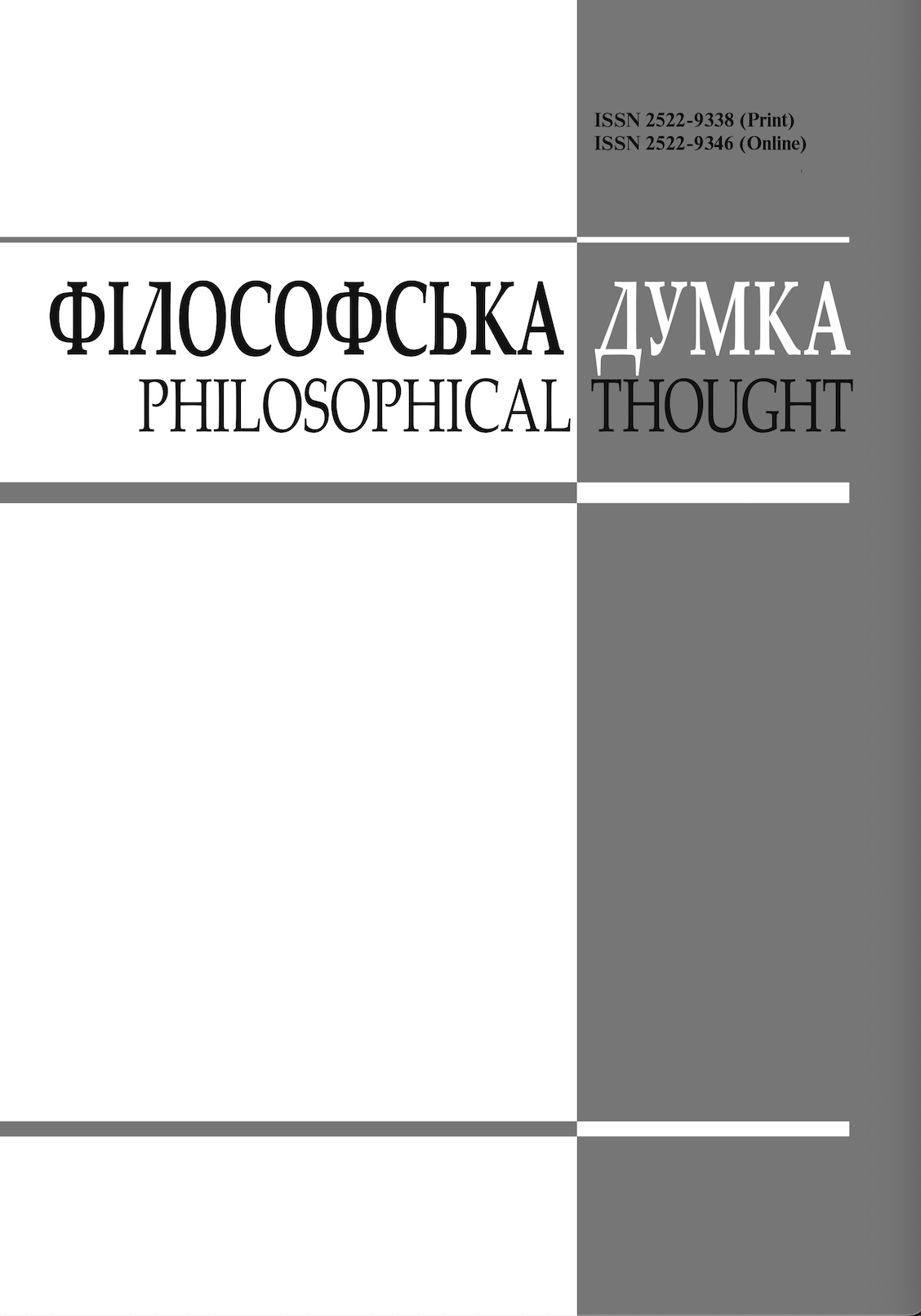Evolution of the concept of the absolute in Fiche
History of world philosophy
DOI:
https://doi.org/10.15407/fd2024.01.096Keywords:
Fichte, Absolute, manifestation, I, knowledge, the theory of image, God, being, lightAbstract
The article offers an analysis of the concept of the Absolute in Fichte’s philosophy. Despite the difficulty of the definition, this concept receives a rich and creative rethinking in Fichte and will further influence the philosophical systems of thought. Gradually introducing this concept into his philosophical project of Wissenschaftslehre Fichte often changes its interpretation. So, starting with a somewhat vague understanding of the concept of the "absolute I" through Schelling's criticism of the Absolute, he develops the theory of the manifestation of the Absolute, each time choosing new metaphors to denote it, and sometimes filling it with religious content, when the Absolute becomes a substitute for the concept of God.
On the one hand, it’s important not to reduce the Absolute to a simple object of thought because this would indicate the limitation of the Absolute. On the other hand, it would be wrong to consider the Absolute as an empty or neutral concept or something completely enclosed in itself. Then, its existence will be doubtful. Fichte is careful about a clear definition of the Absolute. He solves this dilemma through the idea of the manifestation of the Absolute. Manifestation is the exit of the Absolute beyond itself while remaining unchanged. The ability to manifest itself is a prerequisite that the Absolute can be recognized and thought. This is how the Absolute manifests itself in the form of knowledge. Fichte emphasizes that the Absolute is not a projection of our mind, it may not depend on our thinking, however with such peculiarity that truth and knowledge have their basis in it. Thereby, with the theory of the Absolute, Fichte develops the idea of the foundation that is outside of ourselves, has transcendental character, and thus allows knowledge or truth not to be trapped in subjective tenets. Analyzing step by step the process of evolution of this concept, we will be able to see how in the last years of his life, Fichte states the importance of two realities: the “I” and the “Absolute” and how he explains the connection between them.
References
Asmuth, Ch. (2019). Kharkiv lectures: J.G. Fichte and J.B. Schad: education as a task. [In Ukrainian]. Philosophy of Education, 2(25), 100-113.
https://doi.org/10.31874/2309-1606-2019-25-2-5
Cesa, C. (2008). Introduzione a Fichte. Roma, Bari: Editori Laterza.
Fichte, J.G. (1962-2012). Gesamtausgabe der Bayerischen Akademie der Wissenschaften. Hrsg. von R. Lauth und H. Jacob. Stuttgart, Bad Cannstatt: Frommann-Holzboog.
Johann Gottlieb Fichtes sämmtliche Werke (1971). Hrsg. von Immanuel Hermann Fichte. Berlin: Veit und Comp. Fichte Werke (1845-1856) in 8 Bd. Berlin: Walter de Gruyter and Co.
Fuchs, E. (2014). Fichte's Final Year. Rivista di storia della filosofia, 69(4), 585-600.
https://doi.org/10.3280/SF2014-004002
Ivaldo, M. (2014). La costituzione dell'immagine e l'assoluto nel tardo Fichte. Rivista di storia della filosofia, 69(4), 667-684.
https://doi.org/10.3280/SF2014-004007
Kultaeva, M. (2022). Education and Self-knowledge: On Actuality of Philosophical-educational ideas of Hryhorii Skovoroda and Johann Gottlieb Fichte. [In Ukrainian] Philosophy of Education, 28(2), 8-36.
https://doi.org/10.31874/2309-1606-2022-28-2-1
Vaysse, J.-M. (2017). Absolu et phénomène dans la dernière philosophie de Fichte, In: Fichte: la philosophie de la maturité. T. I. Les derniers exposés de la Doctrine dela science. Toulouse: EuroPhilosophie Éditions. Retrieved from: https://books.openedition.org/europhilosophie/317
Veweyen, H. (2016). Fichte's Philosophy of Religion. In: The Cambridge Companion to Fichte. Ed. by David James (pp. 273-305). Cambridge University Press.
https://doi.org/10.1017/9781139027557.012
Zöller, G. (1998). Fichte's Transcendental Philosophy. The Original Duplicity of Intelligence and Will. Cambridge University Press.
https://doi.org/10.1017/CBO9781139173100
Zöller, G. (2007). Intelligenza nella fede. Il fondamento oscuro del sapere nella "Dottrina della Scienza" 1805. Rivista di storia della filosofia, 62(1), 27-40.
Zöller, G. (2013). Fichte lesen. Stuttgart, Bad Cannstatt: Frommann-Holzboog Verlag.
https://doi.org/10.5771/9783772830426
Zöller, G. (2016). Fichte's Later Presentation of Wissenschaftslehre. In: The Cambridge Companion to Fichte. Ed. by David James (pp. 139-167). Cambridge University Press.
https://doi.org/10.1017/9781139027557.007
Zöller, G. (2017). Le legs de Fichte. Les denieres textes sur la Wissenschaftslehre (1813-1814). In: Fichte: la philosophie de la maturité. T. I. Les derniers exposés de la Doctrine dela science. Toulouse: EuroPhilosophie Éditions. Retrieved from: https://books.openedition.org/europhilosophie/327
Downloads
-
PDF (Українська)
Downloads: 106
Published
How to Cite
Issue
Section
License
Authors who publish with this journal agree to the following terms:
- Authors retain copyright and grant the journal right of first publication.
- Authors are able to enter into separate, additional contractual arrangements for the non-exclusive distribution of the journal's published version of the work (e.g., post it to an institutional repository or publish it in a book), with an acknowledgement of its initial publication in this journal.
- Authors are permitted and encouraged to post their work online (e.g., in institutional repositories or on their website) prior to and during the submission process, as it can lead to productive exchanges, as well as earlier and greater citation of published work (See The Effect of Open Access).


